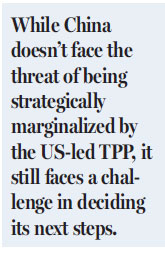US' withdrawal from TPP creates new challenges
The implications for China of US President Donald Trump's decision to withdraw the United States from the Trans-Pacific Partnership agreement has drawn much attention, with many arguing it will enable China to play a bigger role in trade governance in the Asia-Pacific. While this might indeed be so, it also presents China with new challenges.
In his last few months as president, Barack Obama repeatedly emphasized the importance of the US ratifying the TPP in order to "contain" China. He and his administration argued that the failure to ratify the TPP would mean China, rather than the US, would write the trade rules for the Asia-Pacific. This narrative, supported by a large number of analysts and experts, strengthened the impression of the TPP being essentially an instrument for strengthening the US' strategic influence in the region: The TPP would have brought together regional allies of the US into a common trade framework led by the US. This surely would have been an uncomfortable proposition for China.

So the withdrawal of the US from the TPP, aborting the US' efforts to lead the regional order, has for the time being reduced China's apprehension of being strategically cornered by unfavorable trade agreements.









